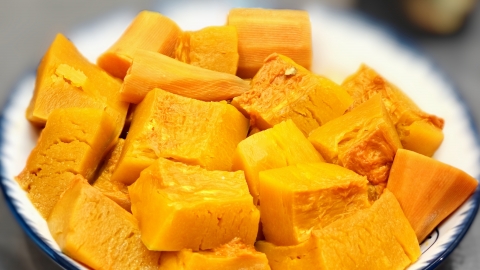What are the health benefits and effects of pumpkin?
Generally speaking, as a common ingredient used both medicinally and as food, pumpkin has various functions and benefits, including supplementing beta-carotene, promoting digestion, assisting in blood sugar regulation, providing minerals, and protecting the gastric mucosa. The details are as follows:

1. Supplement beta-carotene: Pumpkin is rich in beta-carotene. Once ingested, this component can be converted into vitamin A, which helps maintain healthy vision, improves dry skin conditions, and provides basic nutritional support to the body, aiding in the normal functioning of epithelial tissues, making it suitable for daily dietary supplementation.
2. Promote digestion: Pumpkin contains abundant dietary fiber and pectin. Dietary fiber stimulates intestinal motility, accelerates the digestion and absorption of food, and helps relieve constipation. Pectin can adsorb excess waste in the intestines, reduce the burden on the gastrointestinal tract, and improve symptoms such as bloating and loss of appetite caused by indigestion.
3. Assist in blood sugar regulation: The pectin in pumpkin can delay the absorption of sugars from food, helping to reduce the rise in blood glucose levels after meals. Additionally, its dietary fiber increases satiety and reduces the intake of other high-sugar foods, making it suitable for people needing to control their blood sugar to consume in moderation.
4. Supplement minerals: Pumpkin contains various minerals such as potassium, magnesium, and calcium. Potassium helps maintain the body's electrolyte balance, while magnesium participates in energy metabolism. These minerals provide essential trace element support for the body.
5. Protect the gastric mucosa: Pumpkin is mild in nature and contains pectin with a viscous property that can form a protective layer on the surface of the gastric mucosa, reducing irritation from gastric acid. It is suitable for relieving mild stomach discomfort, especially recommended for individuals with sensitive stomachs or spleen and stomach weakness.
When consuming pumpkin, it is important to control the amount. Excessive consumption may lead to temporary yellowing of the skin due to excessive intake of beta-carotene. Although pumpkin can assist in regulating blood sugar, diabetic patients still need to account for it within their daily total caloric intake and avoid excessive consumption.






